Dissertation: Business Ethics Impact - Iceland Retail
VerifiedAdded on 2020/04/29
|52
|14752
|87
Thesis and Dissertation
AI Summary
This dissertation, submitted by Anis Sahraoui, investigates the impact of business ethics on the organizational performance of Iceland Retail Company in the UK. The research employs a mixed-methods approach, combining qualitative and quantitative data analysis to examine the relationship between ethical conduct and organizational success. The study explores the meaning and concept of business ethics, addresses its impact on Iceland Retail, and recommends strategies to promote ethical practices. The dissertation includes a comprehensive literature review, examining relevant theories such as the Employee Risk Triangle Theory and the Stress Facilitation Theory, along with empirical studies. Findings indicate a positive correlation between business ethics and organizational performance, emphasizing the importance of ethical considerations in business operations. The research also provides a detailed overview of Iceland Retail, its market position, and its corporate social responsibility initiatives, supported by data analysis and case studies. The dissertation concludes with recommendations for improving business ethics within the organization to enhance its overall performance and image.
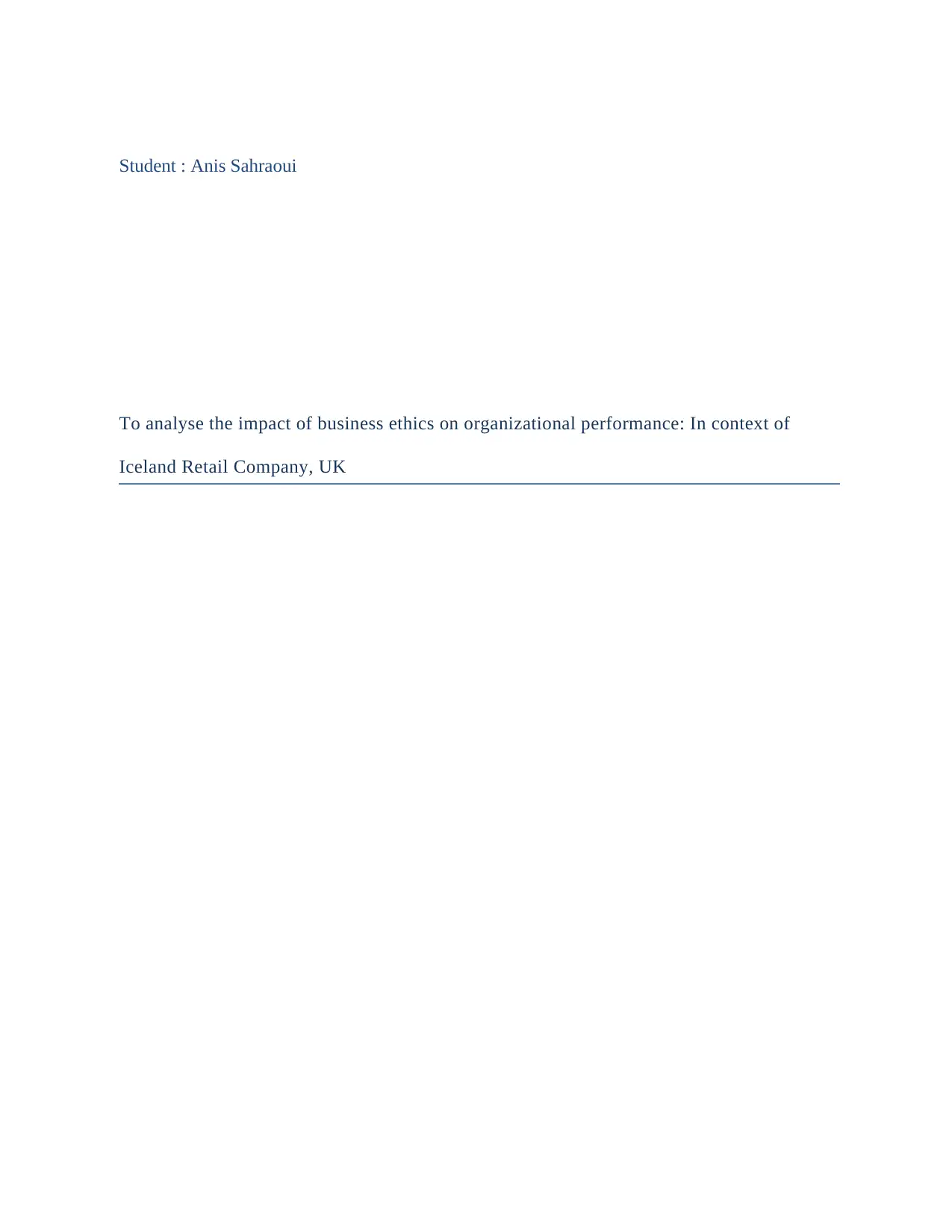
Student : Anis Sahraoui
To analyse the impact of business ethics on organizational performance: In context of
Iceland Retail Company, UK
To analyse the impact of business ethics on organizational performance: In context of
Iceland Retail Company, UK
Paraphrase This Document
Need a fresh take? Get an instant paraphrase of this document with our AI Paraphraser
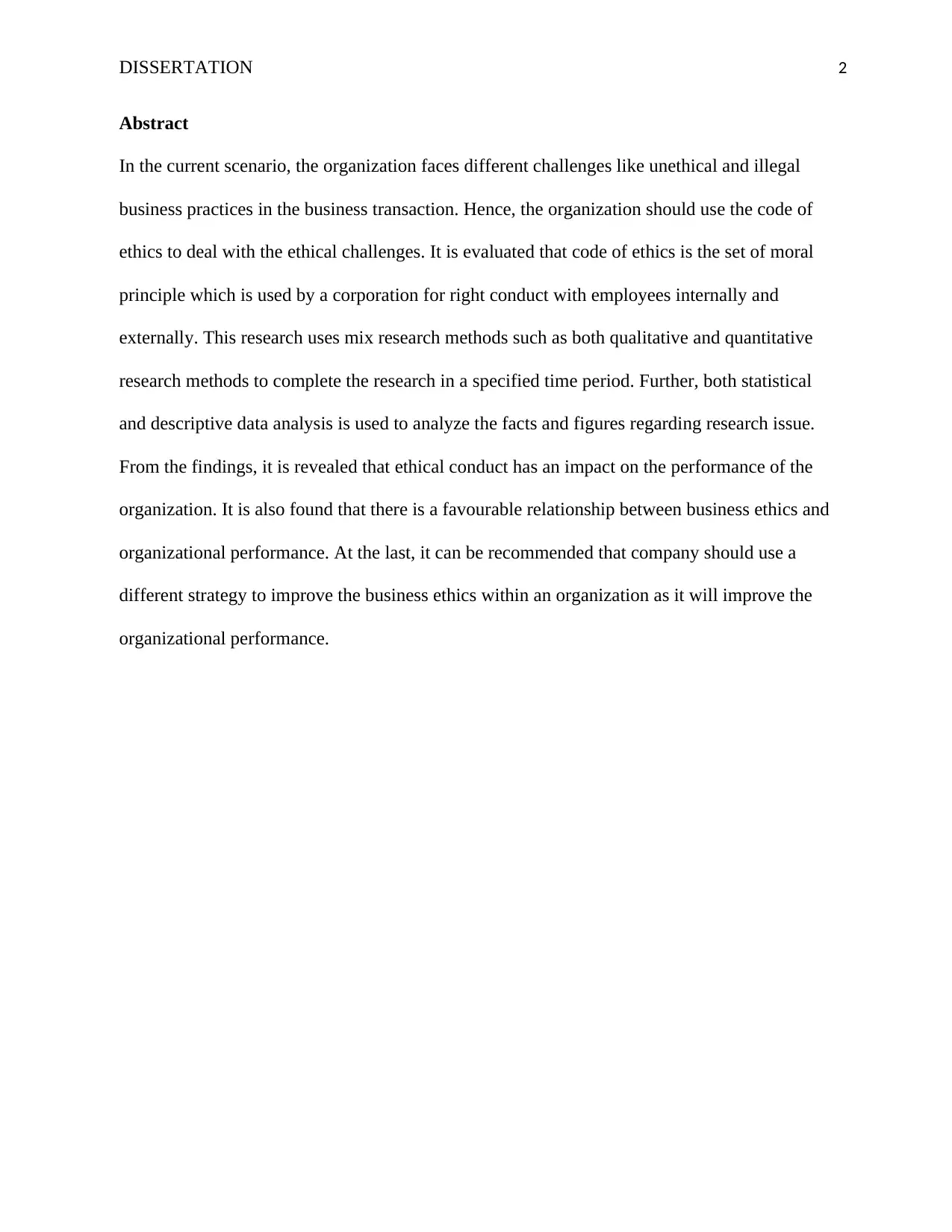
DISSERTATION 2
Abstract
In the current scenario, the organization faces different challenges like unethical and illegal
business practices in the business transaction. Hence, the organization should use the code of
ethics to deal with the ethical challenges. It is evaluated that code of ethics is the set of moral
principle which is used by a corporation for right conduct with employees internally and
externally. This research uses mix research methods such as both qualitative and quantitative
research methods to complete the research in a specified time period. Further, both statistical
and descriptive data analysis is used to analyze the facts and figures regarding research issue.
From the findings, it is revealed that ethical conduct has an impact on the performance of the
organization. It is also found that there is a favourable relationship between business ethics and
organizational performance. At the last, it can be recommended that company should use a
different strategy to improve the business ethics within an organization as it will improve the
organizational performance.
Abstract
In the current scenario, the organization faces different challenges like unethical and illegal
business practices in the business transaction. Hence, the organization should use the code of
ethics to deal with the ethical challenges. It is evaluated that code of ethics is the set of moral
principle which is used by a corporation for right conduct with employees internally and
externally. This research uses mix research methods such as both qualitative and quantitative
research methods to complete the research in a specified time period. Further, both statistical
and descriptive data analysis is used to analyze the facts and figures regarding research issue.
From the findings, it is revealed that ethical conduct has an impact on the performance of the
organization. It is also found that there is a favourable relationship between business ethics and
organizational performance. At the last, it can be recommended that company should use a
different strategy to improve the business ethics within an organization as it will improve the
organizational performance.
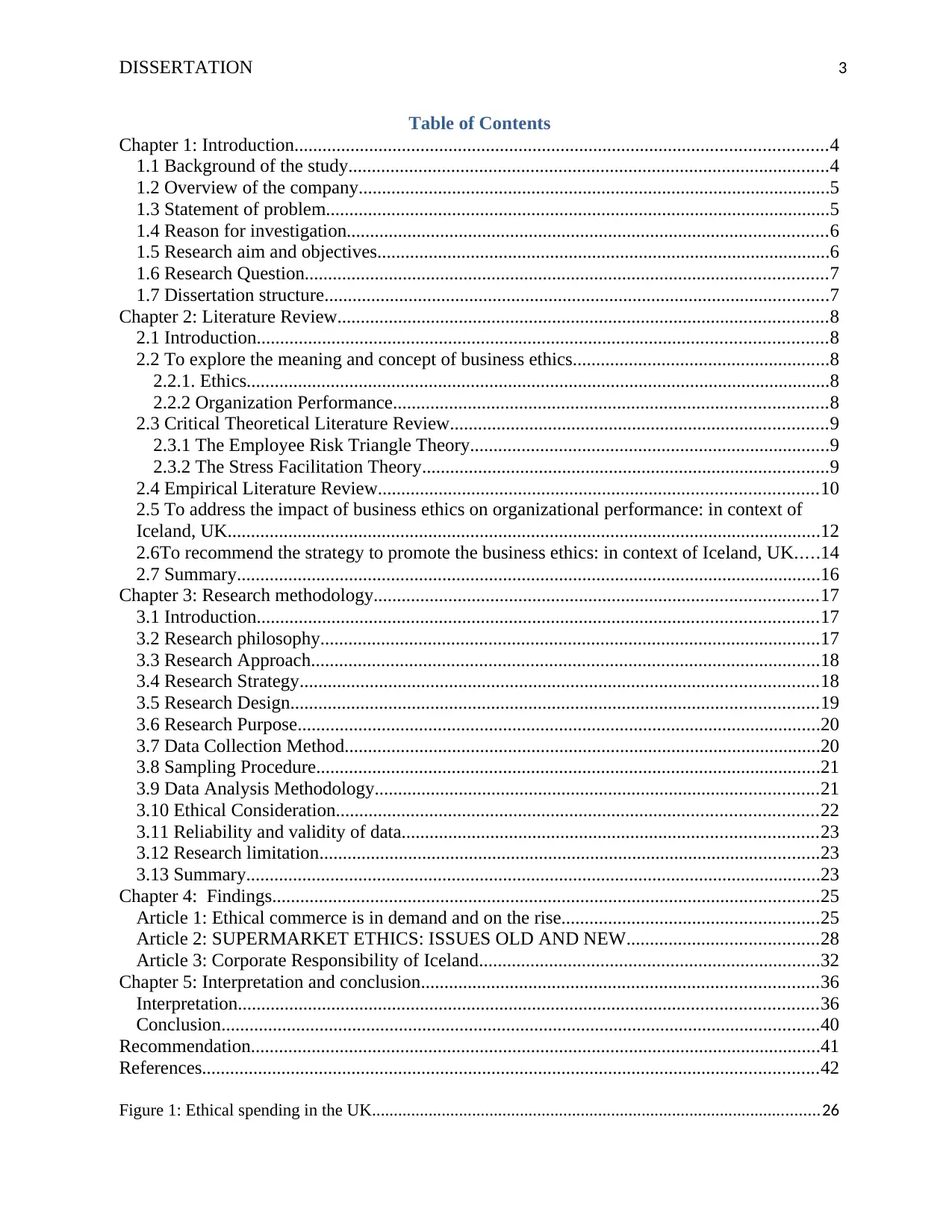
DISSERTATION 3
Table of Contents
Chapter 1: Introduction..................................................................................................................4
1.1 Background of the study.......................................................................................................4
1.2 Overview of the company.....................................................................................................5
1.3 Statement of problem............................................................................................................5
1.4 Reason for investigation.......................................................................................................6
1.5 Research aim and objectives.................................................................................................6
1.6 Research Question................................................................................................................7
1.7 Dissertation structure............................................................................................................7
Chapter 2: Literature Review.........................................................................................................8
2.1 Introduction..........................................................................................................................8
2.2 To explore the meaning and concept of business ethics.......................................................8
2.2.1. Ethics.............................................................................................................................8
2.2.2 Organization Performance.............................................................................................8
2.3 Critical Theoretical Literature Review.................................................................................9
2.3.1 The Employee Risk Triangle Theory.............................................................................9
2.3.2 The Stress Facilitation Theory.......................................................................................9
2.4 Empirical Literature Review..............................................................................................10
2.5 To address the impact of business ethics on organizational performance: in context of
Iceland, UK...............................................................................................................................12
2.6To recommend the strategy to promote the business ethics: in context of Iceland, UK.....14
2.7 Summary.............................................................................................................................16
Chapter 3: Research methodology...............................................................................................17
3.1 Introduction........................................................................................................................17
3.2 Research philosophy...........................................................................................................17
3.3 Research Approach.............................................................................................................18
3.4 Research Strategy...............................................................................................................18
3.5 Research Design.................................................................................................................19
3.6 Research Purpose................................................................................................................20
3.7 Data Collection Method......................................................................................................20
3.8 Sampling Procedure............................................................................................................21
3.9 Data Analysis Methodology...............................................................................................21
3.10 Ethical Consideration.......................................................................................................22
3.11 Reliability and validity of data.........................................................................................23
3.12 Research limitation...........................................................................................................23
3.13 Summary...........................................................................................................................23
Chapter 4: Findings.....................................................................................................................25
Article 1: Ethical commerce is in demand and on the rise.......................................................25
Article 2: SUPERMARKET ETHICS: ISSUES OLD AND NEW.........................................28
Article 3: Corporate Responsibility of Iceland.........................................................................32
Chapter 5: Interpretation and conclusion.....................................................................................36
Interpretation............................................................................................................................36
Conclusion................................................................................................................................40
Recommendation..........................................................................................................................41
References....................................................................................................................................42
Figure 1: Ethical spending in the UK.......................................................................................................26
Table of Contents
Chapter 1: Introduction..................................................................................................................4
1.1 Background of the study.......................................................................................................4
1.2 Overview of the company.....................................................................................................5
1.3 Statement of problem............................................................................................................5
1.4 Reason for investigation.......................................................................................................6
1.5 Research aim and objectives.................................................................................................6
1.6 Research Question................................................................................................................7
1.7 Dissertation structure............................................................................................................7
Chapter 2: Literature Review.........................................................................................................8
2.1 Introduction..........................................................................................................................8
2.2 To explore the meaning and concept of business ethics.......................................................8
2.2.1. Ethics.............................................................................................................................8
2.2.2 Organization Performance.............................................................................................8
2.3 Critical Theoretical Literature Review.................................................................................9
2.3.1 The Employee Risk Triangle Theory.............................................................................9
2.3.2 The Stress Facilitation Theory.......................................................................................9
2.4 Empirical Literature Review..............................................................................................10
2.5 To address the impact of business ethics on organizational performance: in context of
Iceland, UK...............................................................................................................................12
2.6To recommend the strategy to promote the business ethics: in context of Iceland, UK.....14
2.7 Summary.............................................................................................................................16
Chapter 3: Research methodology...............................................................................................17
3.1 Introduction........................................................................................................................17
3.2 Research philosophy...........................................................................................................17
3.3 Research Approach.............................................................................................................18
3.4 Research Strategy...............................................................................................................18
3.5 Research Design.................................................................................................................19
3.6 Research Purpose................................................................................................................20
3.7 Data Collection Method......................................................................................................20
3.8 Sampling Procedure............................................................................................................21
3.9 Data Analysis Methodology...............................................................................................21
3.10 Ethical Consideration.......................................................................................................22
3.11 Reliability and validity of data.........................................................................................23
3.12 Research limitation...........................................................................................................23
3.13 Summary...........................................................................................................................23
Chapter 4: Findings.....................................................................................................................25
Article 1: Ethical commerce is in demand and on the rise.......................................................25
Article 2: SUPERMARKET ETHICS: ISSUES OLD AND NEW.........................................28
Article 3: Corporate Responsibility of Iceland.........................................................................32
Chapter 5: Interpretation and conclusion.....................................................................................36
Interpretation............................................................................................................................36
Conclusion................................................................................................................................40
Recommendation..........................................................................................................................41
References....................................................................................................................................42
Figure 1: Ethical spending in the UK.......................................................................................................26
⊘ This is a preview!⊘
Do you want full access?
Subscribe today to unlock all pages.

Trusted by 1+ million students worldwide
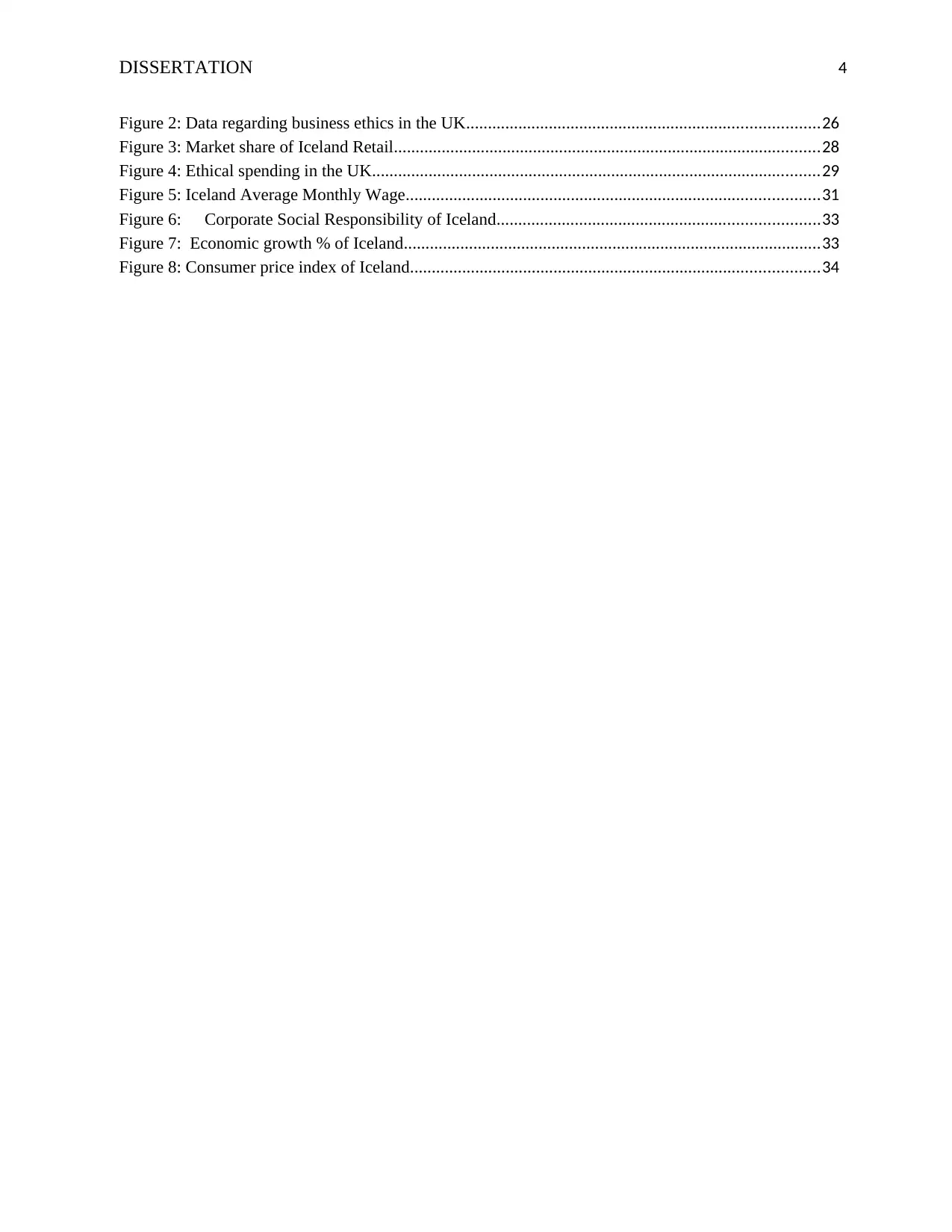
DISSERTATION 4
Figure 2: Data regarding business ethics in the UK.................................................................................26
Figure 3: Market share of Iceland Retail..................................................................................................28
Figure 4: Ethical spending in the UK.......................................................................................................29
Figure 5: Iceland Average Monthly Wage...............................................................................................31
Figure 6: Corporate Social Responsibility of Iceland..........................................................................33
Figure 7: Economic growth % of Iceland................................................................................................33
Figure 8: Consumer price index of Iceland..............................................................................................34
Figure 2: Data regarding business ethics in the UK.................................................................................26
Figure 3: Market share of Iceland Retail..................................................................................................28
Figure 4: Ethical spending in the UK.......................................................................................................29
Figure 5: Iceland Average Monthly Wage...............................................................................................31
Figure 6: Corporate Social Responsibility of Iceland..........................................................................33
Figure 7: Economic growth % of Iceland................................................................................................33
Figure 8: Consumer price index of Iceland..............................................................................................34
Paraphrase This Document
Need a fresh take? Get an instant paraphrase of this document with our AI Paraphraser
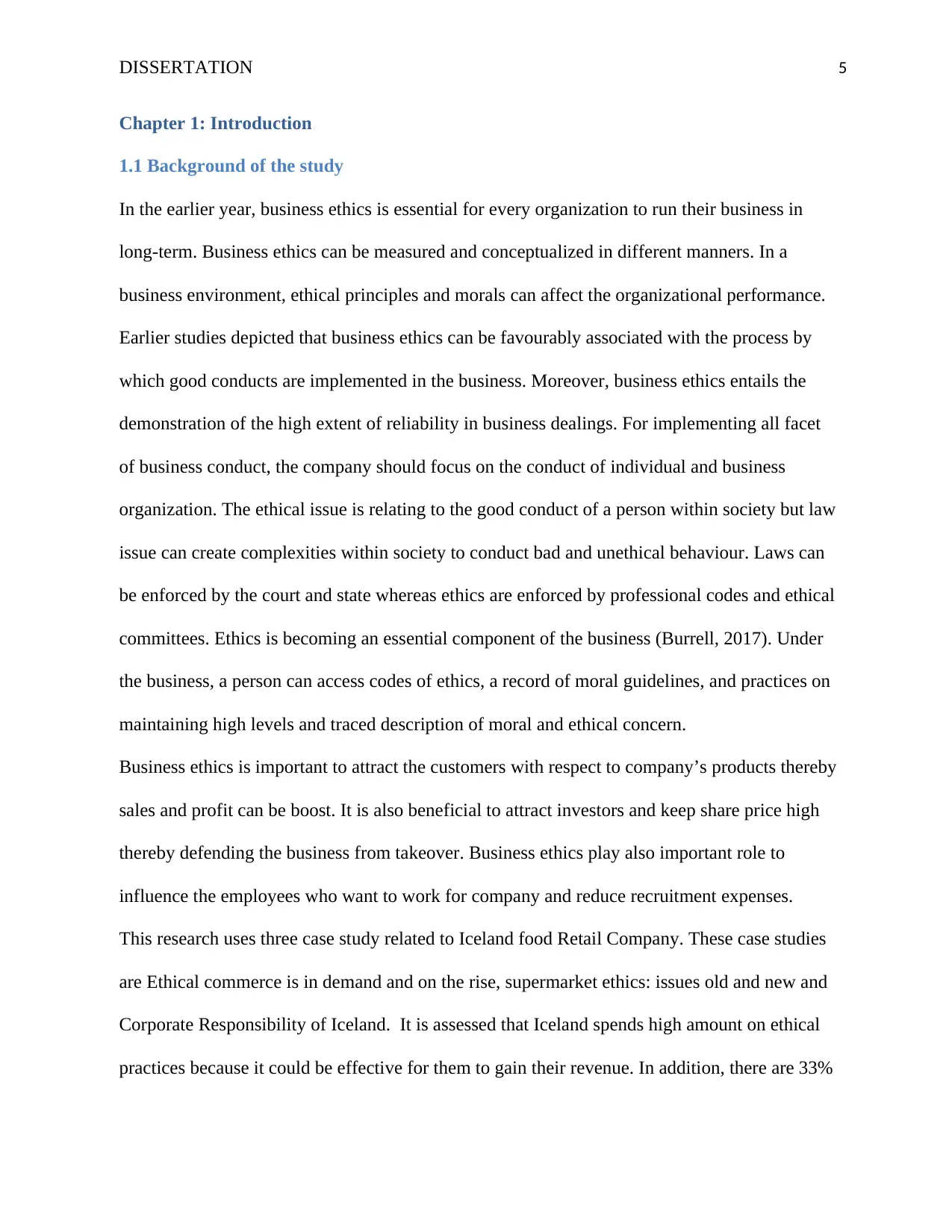
DISSERTATION 5
Chapter 1: Introduction
1.1 Background of the study
In the earlier year, business ethics is essential for every organization to run their business in
long-term. Business ethics can be measured and conceptualized in different manners. In a
business environment, ethical principles and morals can affect the organizational performance.
Earlier studies depicted that business ethics can be favourably associated with the process by
which good conducts are implemented in the business. Moreover, business ethics entails the
demonstration of the high extent of reliability in business dealings. For implementing all facet
of business conduct, the company should focus on the conduct of individual and business
organization. The ethical issue is relating to the good conduct of a person within society but law
issue can create complexities within society to conduct bad and unethical behaviour. Laws can
be enforced by the court and state whereas ethics are enforced by professional codes and ethical
committees. Ethics is becoming an essential component of the business (Burrell, 2017). Under
the business, a person can access codes of ethics, a record of moral guidelines, and practices on
maintaining high levels and traced description of moral and ethical concern.
Business ethics is important to attract the customers with respect to company’s products thereby
sales and profit can be boost. It is also beneficial to attract investors and keep share price high
thereby defending the business from takeover. Business ethics play also important role to
influence the employees who want to work for company and reduce recruitment expenses.
This research uses three case study related to Iceland food Retail Company. These case studies
are Ethical commerce is in demand and on the rise, supermarket ethics: issues old and new and
Corporate Responsibility of Iceland. It is assessed that Iceland spends high amount on ethical
practices because it could be effective for them to gain their revenue. In addition, there are 33%
Chapter 1: Introduction
1.1 Background of the study
In the earlier year, business ethics is essential for every organization to run their business in
long-term. Business ethics can be measured and conceptualized in different manners. In a
business environment, ethical principles and morals can affect the organizational performance.
Earlier studies depicted that business ethics can be favourably associated with the process by
which good conducts are implemented in the business. Moreover, business ethics entails the
demonstration of the high extent of reliability in business dealings. For implementing all facet
of business conduct, the company should focus on the conduct of individual and business
organization. The ethical issue is relating to the good conduct of a person within society but law
issue can create complexities within society to conduct bad and unethical behaviour. Laws can
be enforced by the court and state whereas ethics are enforced by professional codes and ethical
committees. Ethics is becoming an essential component of the business (Burrell, 2017). Under
the business, a person can access codes of ethics, a record of moral guidelines, and practices on
maintaining high levels and traced description of moral and ethical concern.
Business ethics is important to attract the customers with respect to company’s products thereby
sales and profit can be boost. It is also beneficial to attract investors and keep share price high
thereby defending the business from takeover. Business ethics play also important role to
influence the employees who want to work for company and reduce recruitment expenses.
This research uses three case study related to Iceland food Retail Company. These case studies
are Ethical commerce is in demand and on the rise, supermarket ethics: issues old and new and
Corporate Responsibility of Iceland. It is assessed that Iceland spends high amount on ethical
practices because it could be effective for them to gain their revenue. In addition, there are 33%
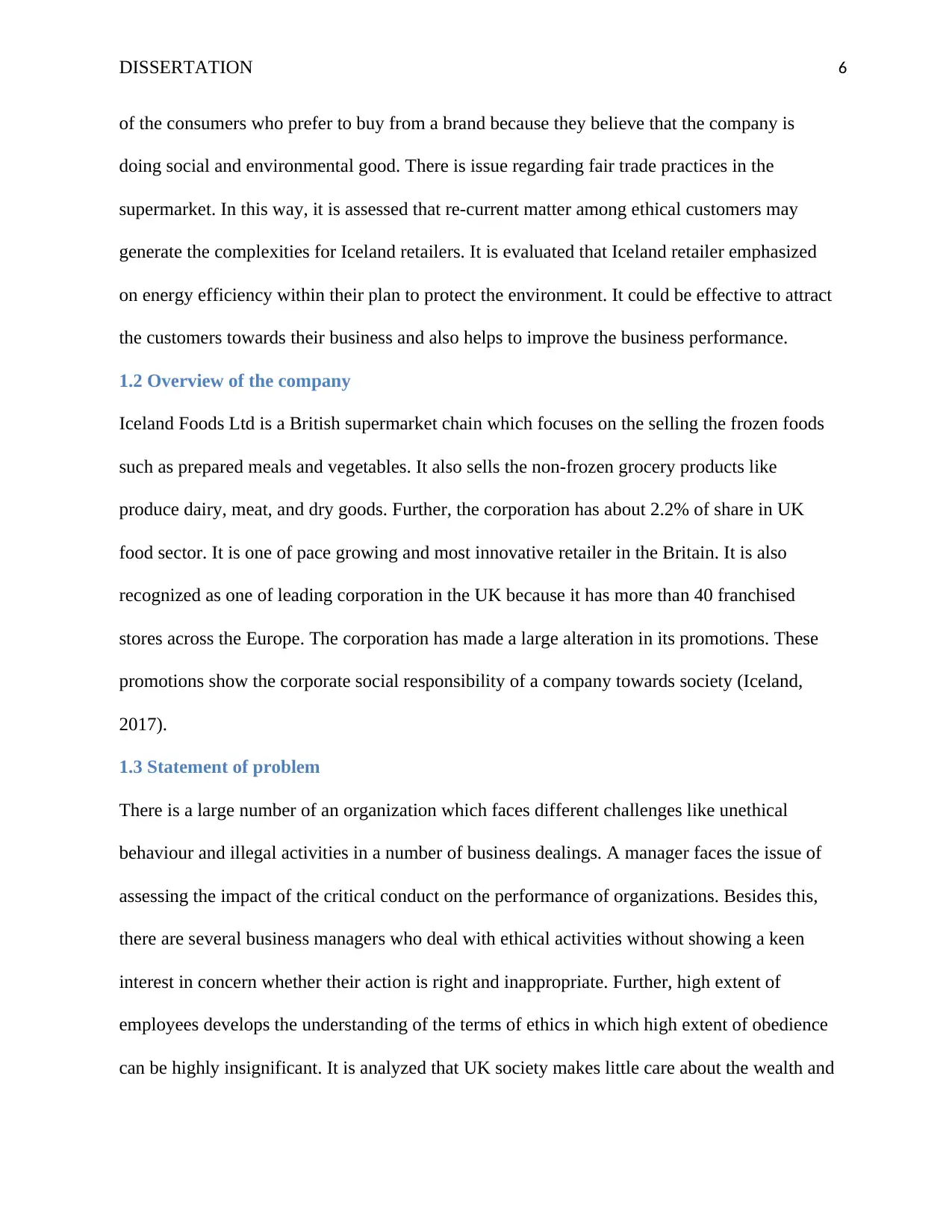
DISSERTATION 6
of the consumers who prefer to buy from a brand because they believe that the company is
doing social and environmental good. There is issue regarding fair trade practices in the
supermarket. In this way, it is assessed that re-current matter among ethical customers may
generate the complexities for Iceland retailers. It is evaluated that Iceland retailer emphasized
on energy efficiency within their plan to protect the environment. It could be effective to attract
the customers towards their business and also helps to improve the business performance.
1.2 Overview of the company
Iceland Foods Ltd is a British supermarket chain which focuses on the selling the frozen foods
such as prepared meals and vegetables. It also sells the non-frozen grocery products like
produce dairy, meat, and dry goods. Further, the corporation has about 2.2% of share in UK
food sector. It is one of pace growing and most innovative retailer in the Britain. It is also
recognized as one of leading corporation in the UK because it has more than 40 franchised
stores across the Europe. The corporation has made a large alteration in its promotions. These
promotions show the corporate social responsibility of a company towards society (Iceland,
2017).
1.3 Statement of problem
There is a large number of an organization which faces different challenges like unethical
behaviour and illegal activities in a number of business dealings. A manager faces the issue of
assessing the impact of the critical conduct on the performance of organizations. Besides this,
there are several business managers who deal with ethical activities without showing a keen
interest in concern whether their action is right and inappropriate. Further, high extent of
employees develops the understanding of the terms of ethics in which high extent of obedience
can be highly insignificant. It is analyzed that UK society makes little care about the wealth and
of the consumers who prefer to buy from a brand because they believe that the company is
doing social and environmental good. There is issue regarding fair trade practices in the
supermarket. In this way, it is assessed that re-current matter among ethical customers may
generate the complexities for Iceland retailers. It is evaluated that Iceland retailer emphasized
on energy efficiency within their plan to protect the environment. It could be effective to attract
the customers towards their business and also helps to improve the business performance.
1.2 Overview of the company
Iceland Foods Ltd is a British supermarket chain which focuses on the selling the frozen foods
such as prepared meals and vegetables. It also sells the non-frozen grocery products like
produce dairy, meat, and dry goods. Further, the corporation has about 2.2% of share in UK
food sector. It is one of pace growing and most innovative retailer in the Britain. It is also
recognized as one of leading corporation in the UK because it has more than 40 franchised
stores across the Europe. The corporation has made a large alteration in its promotions. These
promotions show the corporate social responsibility of a company towards society (Iceland,
2017).
1.3 Statement of problem
There is a large number of an organization which faces different challenges like unethical
behaviour and illegal activities in a number of business dealings. A manager faces the issue of
assessing the impact of the critical conduct on the performance of organizations. Besides this,
there are several business managers who deal with ethical activities without showing a keen
interest in concern whether their action is right and inappropriate. Further, high extent of
employees develops the understanding of the terms of ethics in which high extent of obedience
can be highly insignificant. It is analyzed that UK society makes little care about the wealth and
⊘ This is a preview!⊘
Do you want full access?
Subscribe today to unlock all pages.

Trusted by 1+ million students worldwide
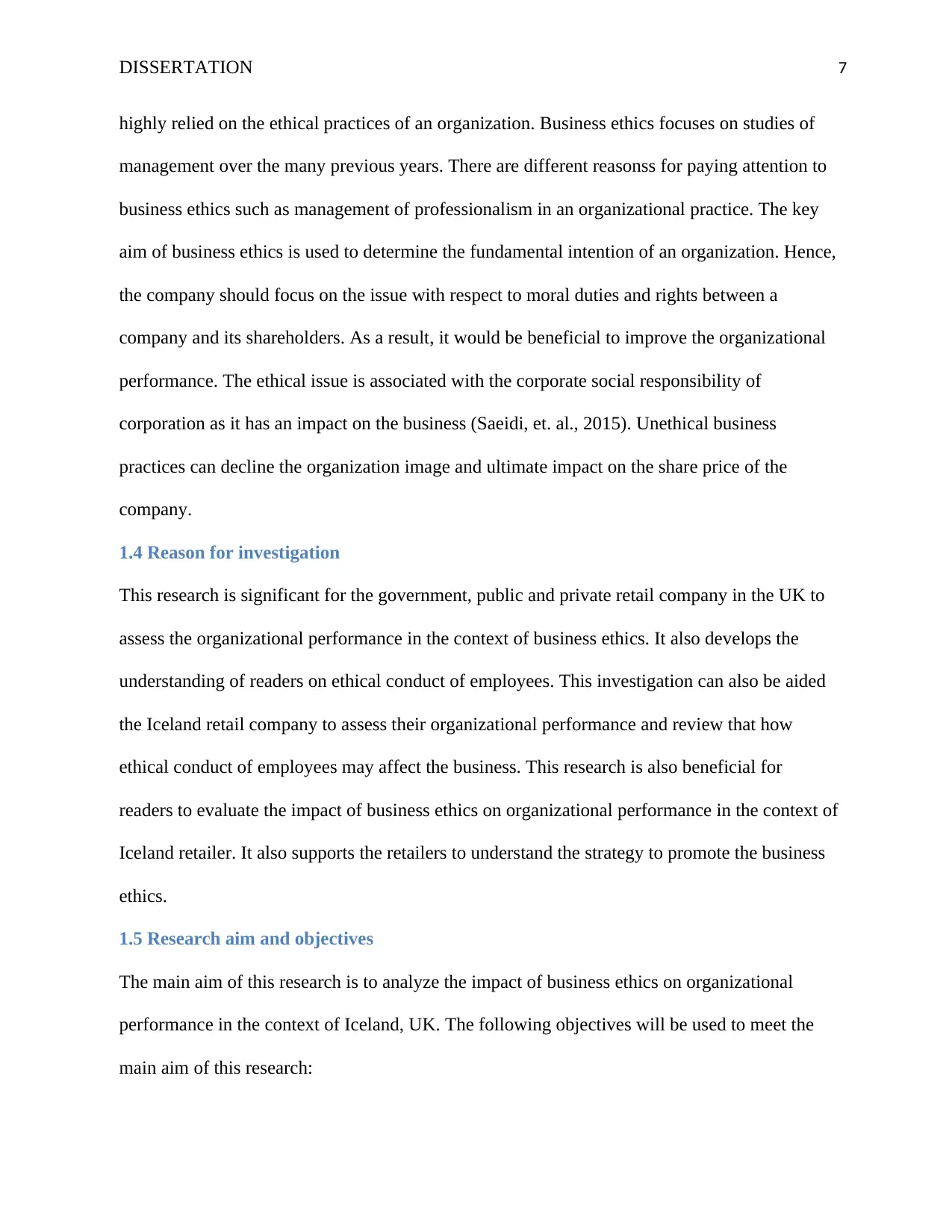
DISSERTATION 7
highly relied on the ethical practices of an organization. Business ethics focuses on studies of
management over the many previous years. There are different reasonss for paying attention to
business ethics such as management of professionalism in an organizational practice. The key
aim of business ethics is used to determine the fundamental intention of an organization. Hence,
the company should focus on the issue with respect to moral duties and rights between a
company and its shareholders. As a result, it would be beneficial to improve the organizational
performance. The ethical issue is associated with the corporate social responsibility of
corporation as it has an impact on the business (Saeidi, et. al., 2015). Unethical business
practices can decline the organization image and ultimate impact on the share price of the
company.
1.4 Reason for investigation
This research is significant for the government, public and private retail company in the UK to
assess the organizational performance in the context of business ethics. It also develops the
understanding of readers on ethical conduct of employees. This investigation can also be aided
the Iceland retail company to assess their organizational performance and review that how
ethical conduct of employees may affect the business. This research is also beneficial for
readers to evaluate the impact of business ethics on organizational performance in the context of
Iceland retailer. It also supports the retailers to understand the strategy to promote the business
ethics.
1.5 Research aim and objectives
The main aim of this research is to analyze the impact of business ethics on organizational
performance in the context of Iceland, UK. The following objectives will be used to meet the
main aim of this research:
highly relied on the ethical practices of an organization. Business ethics focuses on studies of
management over the many previous years. There are different reasonss for paying attention to
business ethics such as management of professionalism in an organizational practice. The key
aim of business ethics is used to determine the fundamental intention of an organization. Hence,
the company should focus on the issue with respect to moral duties and rights between a
company and its shareholders. As a result, it would be beneficial to improve the organizational
performance. The ethical issue is associated with the corporate social responsibility of
corporation as it has an impact on the business (Saeidi, et. al., 2015). Unethical business
practices can decline the organization image and ultimate impact on the share price of the
company.
1.4 Reason for investigation
This research is significant for the government, public and private retail company in the UK to
assess the organizational performance in the context of business ethics. It also develops the
understanding of readers on ethical conduct of employees. This investigation can also be aided
the Iceland retail company to assess their organizational performance and review that how
ethical conduct of employees may affect the business. This research is also beneficial for
readers to evaluate the impact of business ethics on organizational performance in the context of
Iceland retailer. It also supports the retailers to understand the strategy to promote the business
ethics.
1.5 Research aim and objectives
The main aim of this research is to analyze the impact of business ethics on organizational
performance in the context of Iceland, UK. The following objectives will be used to meet the
main aim of this research:
Paraphrase This Document
Need a fresh take? Get an instant paraphrase of this document with our AI Paraphraser
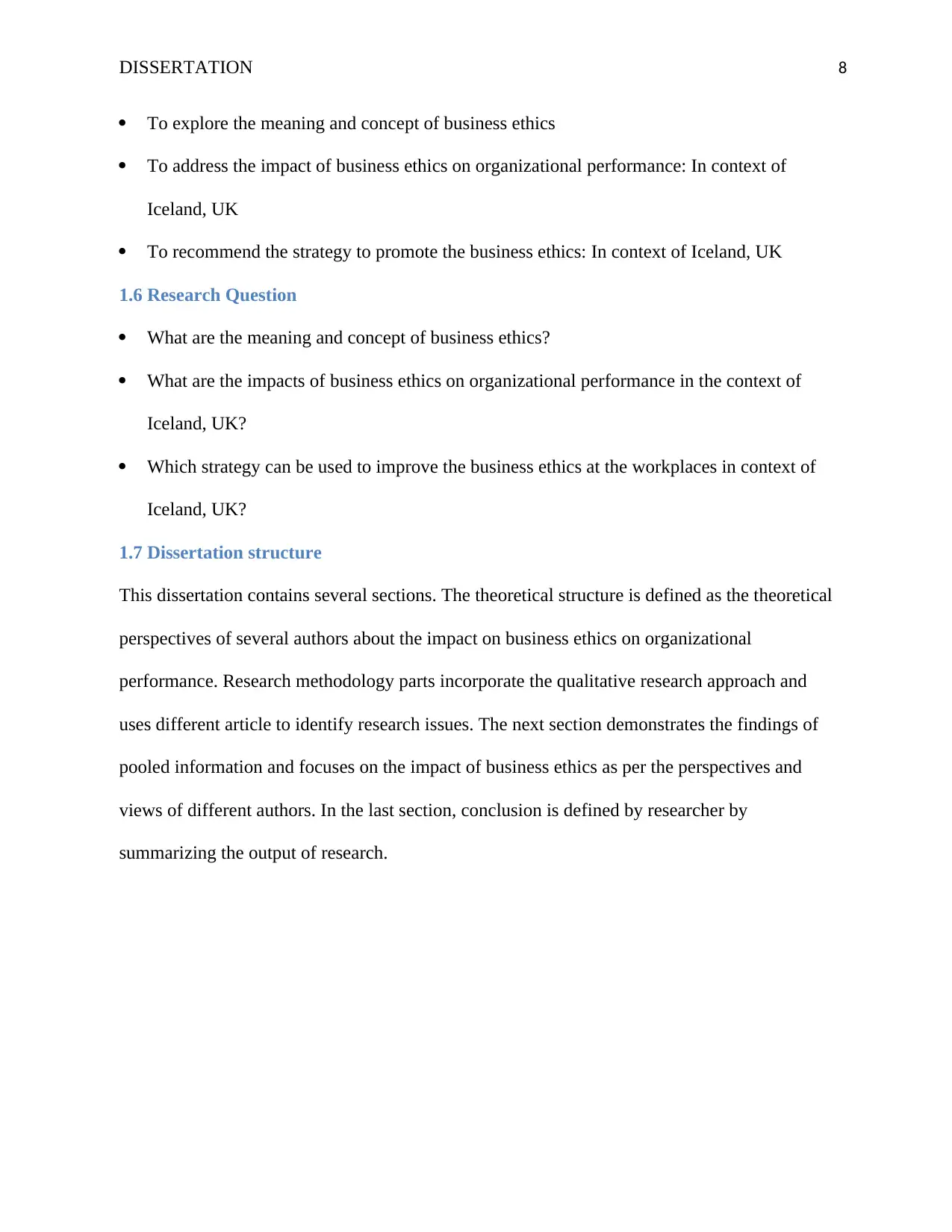
DISSERTATION 8
To explore the meaning and concept of business ethics
To address the impact of business ethics on organizational performance: In context of
Iceland, UK
To recommend the strategy to promote the business ethics: In context of Iceland, UK
1.6 Research Question
What are the meaning and concept of business ethics?
What are the impacts of business ethics on organizational performance in the context of
Iceland, UK?
Which strategy can be used to improve the business ethics at the workplaces in context of
Iceland, UK?
1.7 Dissertation structure
This dissertation contains several sections. The theoretical structure is defined as the theoretical
perspectives of several authors about the impact on business ethics on organizational
performance. Research methodology parts incorporate the qualitative research approach and
uses different article to identify research issues. The next section demonstrates the findings of
pooled information and focuses on the impact of business ethics as per the perspectives and
views of different authors. In the last section, conclusion is defined by researcher by
summarizing the output of research.
To explore the meaning and concept of business ethics
To address the impact of business ethics on organizational performance: In context of
Iceland, UK
To recommend the strategy to promote the business ethics: In context of Iceland, UK
1.6 Research Question
What are the meaning and concept of business ethics?
What are the impacts of business ethics on organizational performance in the context of
Iceland, UK?
Which strategy can be used to improve the business ethics at the workplaces in context of
Iceland, UK?
1.7 Dissertation structure
This dissertation contains several sections. The theoretical structure is defined as the theoretical
perspectives of several authors about the impact on business ethics on organizational
performance. Research methodology parts incorporate the qualitative research approach and
uses different article to identify research issues. The next section demonstrates the findings of
pooled information and focuses on the impact of business ethics as per the perspectives and
views of different authors. In the last section, conclusion is defined by researcher by
summarizing the output of research.
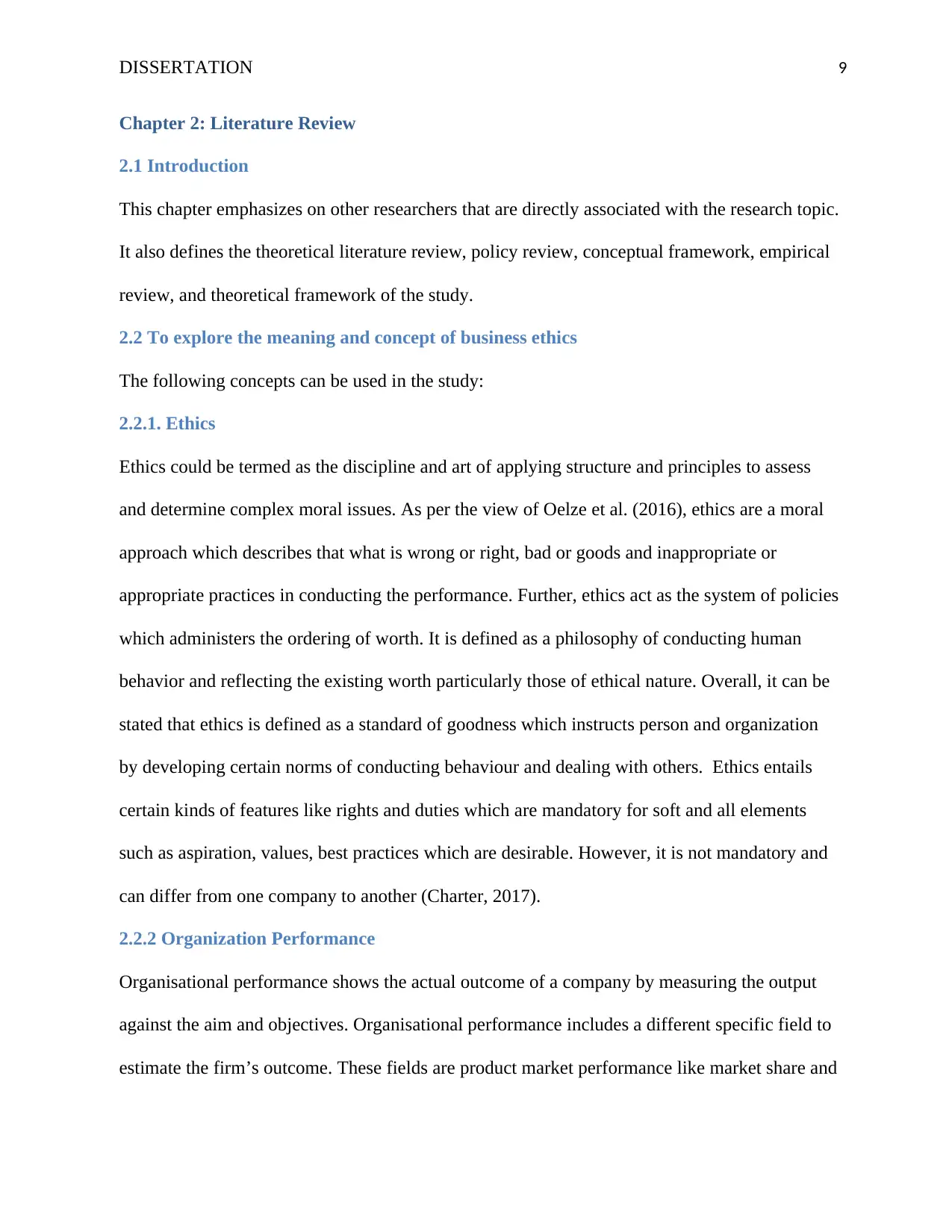
DISSERTATION 9
Chapter 2: Literature Review
2.1 Introduction
This chapter emphasizes on other researchers that are directly associated with the research topic.
It also defines the theoretical literature review, policy review, conceptual framework, empirical
review, and theoretical framework of the study.
2.2 To explore the meaning and concept of business ethics
The following concepts can be used in the study:
2.2.1. Ethics
Ethics could be termed as the discipline and art of applying structure and principles to assess
and determine complex moral issues. As per the view of Oelze et al. (2016), ethics are a moral
approach which describes that what is wrong or right, bad or goods and inappropriate or
appropriate practices in conducting the performance. Further, ethics act as the system of policies
which administers the ordering of worth. It is defined as a philosophy of conducting human
behavior and reflecting the existing worth particularly those of ethical nature. Overall, it can be
stated that ethics is defined as a standard of goodness which instructs person and organization
by developing certain norms of conducting behaviour and dealing with others. Ethics entails
certain kinds of features like rights and duties which are mandatory for soft and all elements
such as aspiration, values, best practices which are desirable. However, it is not mandatory and
can differ from one company to another (Charter, 2017).
2.2.2 Organization Performance
Organisational performance shows the actual outcome of a company by measuring the output
against the aim and objectives. Organisational performance includes a different specific field to
estimate the firm’s outcome. These fields are product market performance like market share and
Chapter 2: Literature Review
2.1 Introduction
This chapter emphasizes on other researchers that are directly associated with the research topic.
It also defines the theoretical literature review, policy review, conceptual framework, empirical
review, and theoretical framework of the study.
2.2 To explore the meaning and concept of business ethics
The following concepts can be used in the study:
2.2.1. Ethics
Ethics could be termed as the discipline and art of applying structure and principles to assess
and determine complex moral issues. As per the view of Oelze et al. (2016), ethics are a moral
approach which describes that what is wrong or right, bad or goods and inappropriate or
appropriate practices in conducting the performance. Further, ethics act as the system of policies
which administers the ordering of worth. It is defined as a philosophy of conducting human
behavior and reflecting the existing worth particularly those of ethical nature. Overall, it can be
stated that ethics is defined as a standard of goodness which instructs person and organization
by developing certain norms of conducting behaviour and dealing with others. Ethics entails
certain kinds of features like rights and duties which are mandatory for soft and all elements
such as aspiration, values, best practices which are desirable. However, it is not mandatory and
can differ from one company to another (Charter, 2017).
2.2.2 Organization Performance
Organisational performance shows the actual outcome of a company by measuring the output
against the aim and objectives. Organisational performance includes a different specific field to
estimate the firm’s outcome. These fields are product market performance like market share and
⊘ This is a preview!⊘
Do you want full access?
Subscribe today to unlock all pages.

Trusted by 1+ million students worldwide
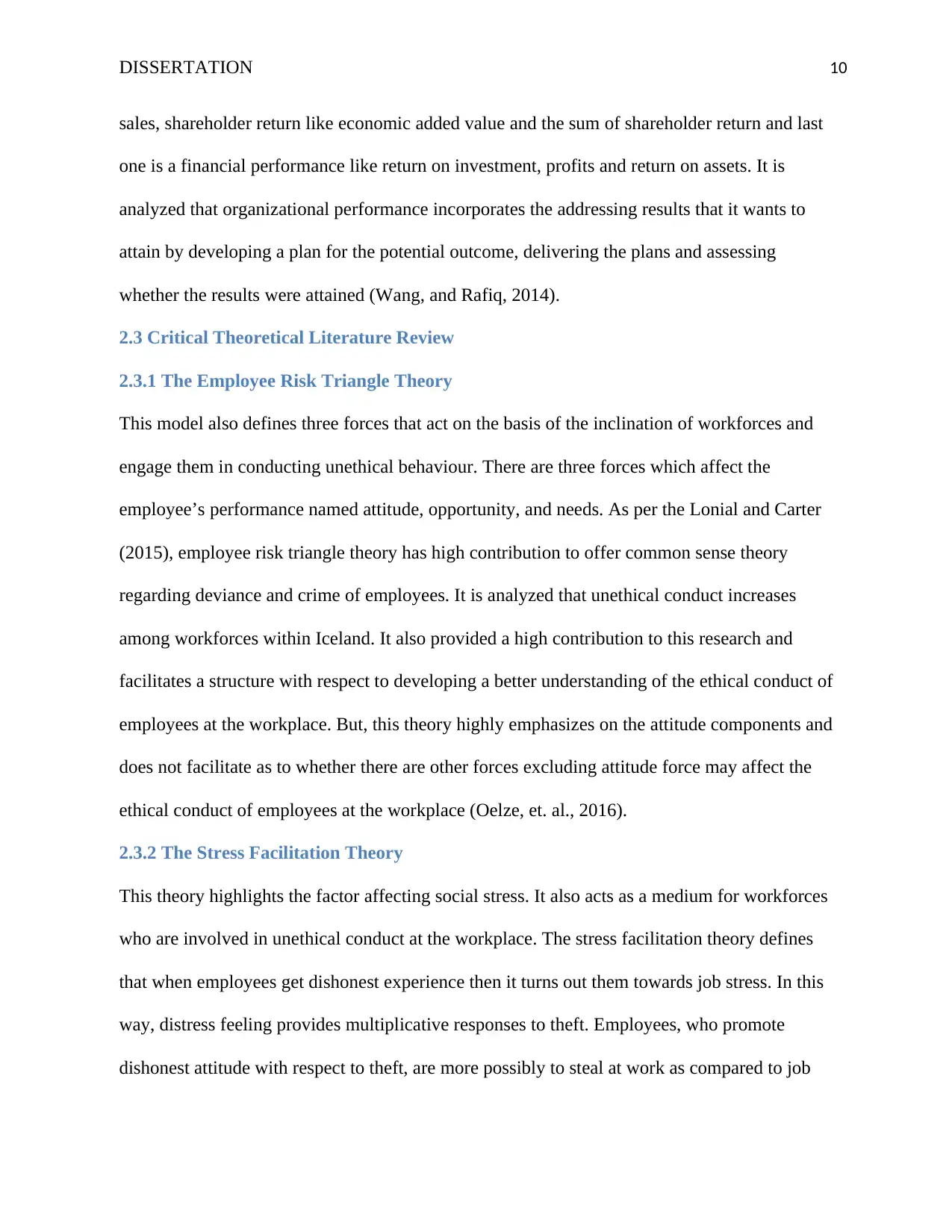
DISSERTATION 10
sales, shareholder return like economic added value and the sum of shareholder return and last
one is a financial performance like return on investment, profits and return on assets. It is
analyzed that organizational performance incorporates the addressing results that it wants to
attain by developing a plan for the potential outcome, delivering the plans and assessing
whether the results were attained (Wang, and Rafiq, 2014).
2.3 Critical Theoretical Literature Review
2.3.1 The Employee Risk Triangle Theory
This model also defines three forces that act on the basis of the inclination of workforces and
engage them in conducting unethical behaviour. There are three forces which affect the
employee’s performance named attitude, opportunity, and needs. As per the Lonial and Carter
(2015), employee risk triangle theory has high contribution to offer common sense theory
regarding deviance and crime of employees. It is analyzed that unethical conduct increases
among workforces within Iceland. It also provided a high contribution to this research and
facilitates a structure with respect to developing a better understanding of the ethical conduct of
employees at the workplace. But, this theory highly emphasizes on the attitude components and
does not facilitate as to whether there are other forces excluding attitude force may affect the
ethical conduct of employees at the workplace (Oelze, et. al., 2016).
2.3.2 The Stress Facilitation Theory
This theory highlights the factor affecting social stress. It also acts as a medium for workforces
who are involved in unethical conduct at the workplace. The stress facilitation theory defines
that when employees get dishonest experience then it turns out them towards job stress. In this
way, distress feeling provides multiplicative responses to theft. Employees, who promote
dishonest attitude with respect to theft, are more possibly to steal at work as compared to job
sales, shareholder return like economic added value and the sum of shareholder return and last
one is a financial performance like return on investment, profits and return on assets. It is
analyzed that organizational performance incorporates the addressing results that it wants to
attain by developing a plan for the potential outcome, delivering the plans and assessing
whether the results were attained (Wang, and Rafiq, 2014).
2.3 Critical Theoretical Literature Review
2.3.1 The Employee Risk Triangle Theory
This model also defines three forces that act on the basis of the inclination of workforces and
engage them in conducting unethical behaviour. There are three forces which affect the
employee’s performance named attitude, opportunity, and needs. As per the Lonial and Carter
(2015), employee risk triangle theory has high contribution to offer common sense theory
regarding deviance and crime of employees. It is analyzed that unethical conduct increases
among workforces within Iceland. It also provided a high contribution to this research and
facilitates a structure with respect to developing a better understanding of the ethical conduct of
employees at the workplace. But, this theory highly emphasizes on the attitude components and
does not facilitate as to whether there are other forces excluding attitude force may affect the
ethical conduct of employees at the workplace (Oelze, et. al., 2016).
2.3.2 The Stress Facilitation Theory
This theory highlights the factor affecting social stress. It also acts as a medium for workforces
who are involved in unethical conduct at the workplace. The stress facilitation theory defines
that when employees get dishonest experience then it turns out them towards job stress. In this
way, distress feeling provides multiplicative responses to theft. Employees, who promote
dishonest attitude with respect to theft, are more possibly to steal at work as compared to job
Paraphrase This Document
Need a fresh take? Get an instant paraphrase of this document with our AI Paraphraser
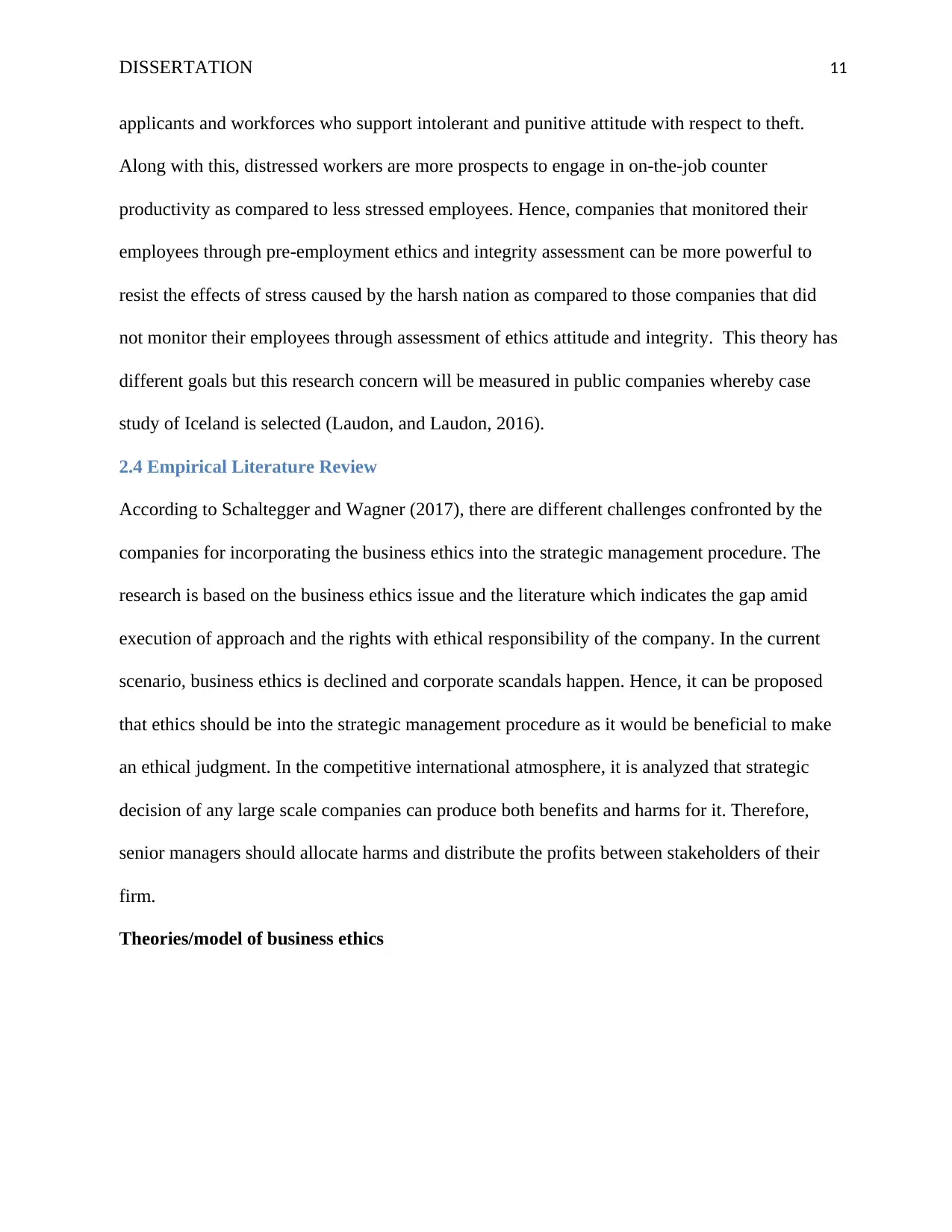
DISSERTATION 11
applicants and workforces who support intolerant and punitive attitude with respect to theft.
Along with this, distressed workers are more prospects to engage in on-the-job counter
productivity as compared to less stressed employees. Hence, companies that monitored their
employees through pre-employment ethics and integrity assessment can be more powerful to
resist the effects of stress caused by the harsh nation as compared to those companies that did
not monitor their employees through assessment of ethics attitude and integrity. This theory has
different goals but this research concern will be measured in public companies whereby case
study of Iceland is selected (Laudon, and Laudon, 2016).
2.4 Empirical Literature Review
According to Schaltegger and Wagner (2017), there are different challenges confronted by the
companies for incorporating the business ethics into the strategic management procedure. The
research is based on the business ethics issue and the literature which indicates the gap amid
execution of approach and the rights with ethical responsibility of the company. In the current
scenario, business ethics is declined and corporate scandals happen. Hence, it can be proposed
that ethics should be into the strategic management procedure as it would be beneficial to make
an ethical judgment. In the competitive international atmosphere, it is analyzed that strategic
decision of any large scale companies can produce both benefits and harms for it. Therefore,
senior managers should allocate harms and distribute the profits between stakeholders of their
firm.
Theories/model of business ethics
applicants and workforces who support intolerant and punitive attitude with respect to theft.
Along with this, distressed workers are more prospects to engage in on-the-job counter
productivity as compared to less stressed employees. Hence, companies that monitored their
employees through pre-employment ethics and integrity assessment can be more powerful to
resist the effects of stress caused by the harsh nation as compared to those companies that did
not monitor their employees through assessment of ethics attitude and integrity. This theory has
different goals but this research concern will be measured in public companies whereby case
study of Iceland is selected (Laudon, and Laudon, 2016).
2.4 Empirical Literature Review
According to Schaltegger and Wagner (2017), there are different challenges confronted by the
companies for incorporating the business ethics into the strategic management procedure. The
research is based on the business ethics issue and the literature which indicates the gap amid
execution of approach and the rights with ethical responsibility of the company. In the current
scenario, business ethics is declined and corporate scandals happen. Hence, it can be proposed
that ethics should be into the strategic management procedure as it would be beneficial to make
an ethical judgment. In the competitive international atmosphere, it is analyzed that strategic
decision of any large scale companies can produce both benefits and harms for it. Therefore,
senior managers should allocate harms and distribute the profits between stakeholders of their
firm.
Theories/model of business ethics
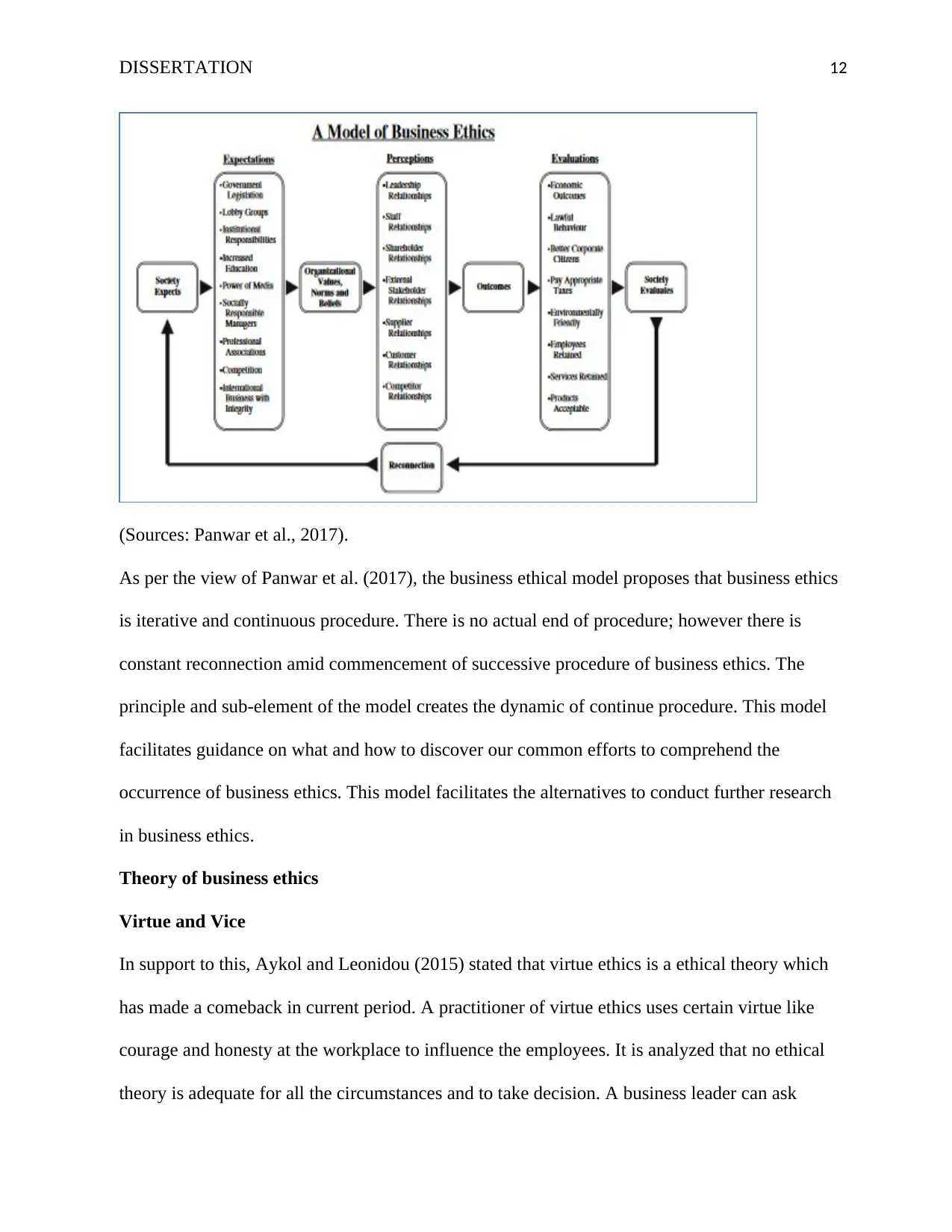
DISSERTATION 12
(Sources: Panwar et al., 2017).
As per the view of Panwar et al. (2017), the business ethical model proposes that business ethics
is iterative and continuous procedure. There is no actual end of procedure; however there is
constant reconnection amid commencement of successive procedure of business ethics. The
principle and sub-element of the model creates the dynamic of continue procedure. This model
facilitates guidance on what and how to discover our common efforts to comprehend the
occurrence of business ethics. This model facilitates the alternatives to conduct further research
in business ethics.
Theory of business ethics
Virtue and Vice
In support to this, Aykol and Leonidou (2015) stated that virtue ethics is a ethical theory which
has made a comeback in current period. A practitioner of virtue ethics uses certain virtue like
courage and honesty at the workplace to influence the employees. It is analyzed that no ethical
theory is adequate for all the circumstances and to take decision. A business leader can ask
(Sources: Panwar et al., 2017).
As per the view of Panwar et al. (2017), the business ethical model proposes that business ethics
is iterative and continuous procedure. There is no actual end of procedure; however there is
constant reconnection amid commencement of successive procedure of business ethics. The
principle and sub-element of the model creates the dynamic of continue procedure. This model
facilitates guidance on what and how to discover our common efforts to comprehend the
occurrence of business ethics. This model facilitates the alternatives to conduct further research
in business ethics.
Theory of business ethics
Virtue and Vice
In support to this, Aykol and Leonidou (2015) stated that virtue ethics is a ethical theory which
has made a comeback in current period. A practitioner of virtue ethics uses certain virtue like
courage and honesty at the workplace to influence the employees. It is analyzed that no ethical
theory is adequate for all the circumstances and to take decision. A business leader can ask
⊘ This is a preview!⊘
Do you want full access?
Subscribe today to unlock all pages.

Trusted by 1+ million students worldwide
1 out of 52
Related Documents
Your All-in-One AI-Powered Toolkit for Academic Success.
+13062052269
info@desklib.com
Available 24*7 on WhatsApp / Email
![[object Object]](/_next/static/media/star-bottom.7253800d.svg)
Unlock your academic potential
Copyright © 2020–2026 A2Z Services. All Rights Reserved. Developed and managed by ZUCOL.





